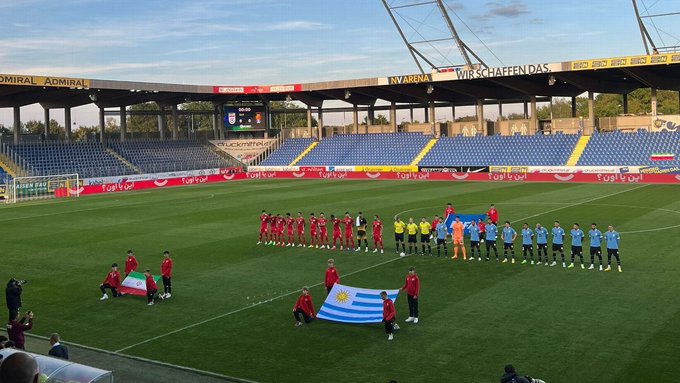Mark Ogden
Senior Writer, ESPN FC
ST. POLTEN, Austria — It was supposed to be just a game, nothing more than a World Cup warm-up friendly between Iran and Uruguay in a sleepy town in rural Austria. Perhaps it’d be a perfect opportunity to scout an Iranian team that will face the United States and England in Group B at Qatar 2022 in two months’ time. But the reality turned out to be something different.
Instead of a regular international fixture, it became an event at the heart of the growing campaign of unrest in Iran surrounding women’s rights, and a focal point for a young population demanding change. The game was scheduled to be played behind closed doors — though fans from both teams were surprisingly allowed into the stadium shortly before kickoff — at the insistence of the Iranian government. They were reportedly fearful of domestic issues being given a public platform in Europe, to the extent that phone calls and WhatsApp messages to the Iranian Football Federation (IFF), simply seeking information on the team schedule and access to the coach, Carlos Queiroz, went unanswered.
The silence also extended to ESPN and other media outlets being told 24 hours before the game that the IFF, under pressure from the regime in Tehran, would not allow journalists into St. Polten’s NV Arena to report on the fixture. “To our greatest discomfort,” the match organizers said via email, “we have to inform you that the entrance to the match Iran vs Uruguay has been denied. This decision was made by the Iranian FA.”
It required the intervention of FIFA, and mediation by Europe-based Iranian journalists, to cause a U-turn on the day of the game. A suggestion that media could attend if they handed over mobile phones before entering the stadium did not materialize, but it was made clear that no interviews with players or Queiroz would be allowed before or after the game.
While the urbane Queiroz was welcoming and cooperative with media at the Pyramide Hotel on the outskirts of Vienna on the day before the game, there was a palpable sense of anxiety and paranoia among the Iranian officials who tried to persuade the former Real Madrid coach to cancel his briefing. Given that the football team is one of the few visible elements of a restricted society in Iran — they face England, the U.S., and Wales in the World Cup this winter — every element of team coverage, particularly during such volatile political times, is guaranteed to attract close scrutiny from the regime in Tehran.
One Austria-based Iran fan smiled and said, “Everything is fine and totally normal in Iran,” when asked about the possibility of protest from those who had turned out to cheer the arrival of the team bus. Moments later, he returned alone to say he had family in Iran and was too worried to speak to western media, but that “even in small cities, people are protesting right now.”
When fans were inexplicably allowed into the game, two spectators were marched out of the ground by police midway through the first half of Iran’s 1-0 win. They had a protest placard in support of Mahsa Amini, the 22-year-old woman who died in police custody in Iran last week after being charged with wearing a headscarf improperly.
In the end, a game intended to be about assessing the strengths and weaknesses of a team that will compete in Qatar this November turned out to be the very definition of a political football.

